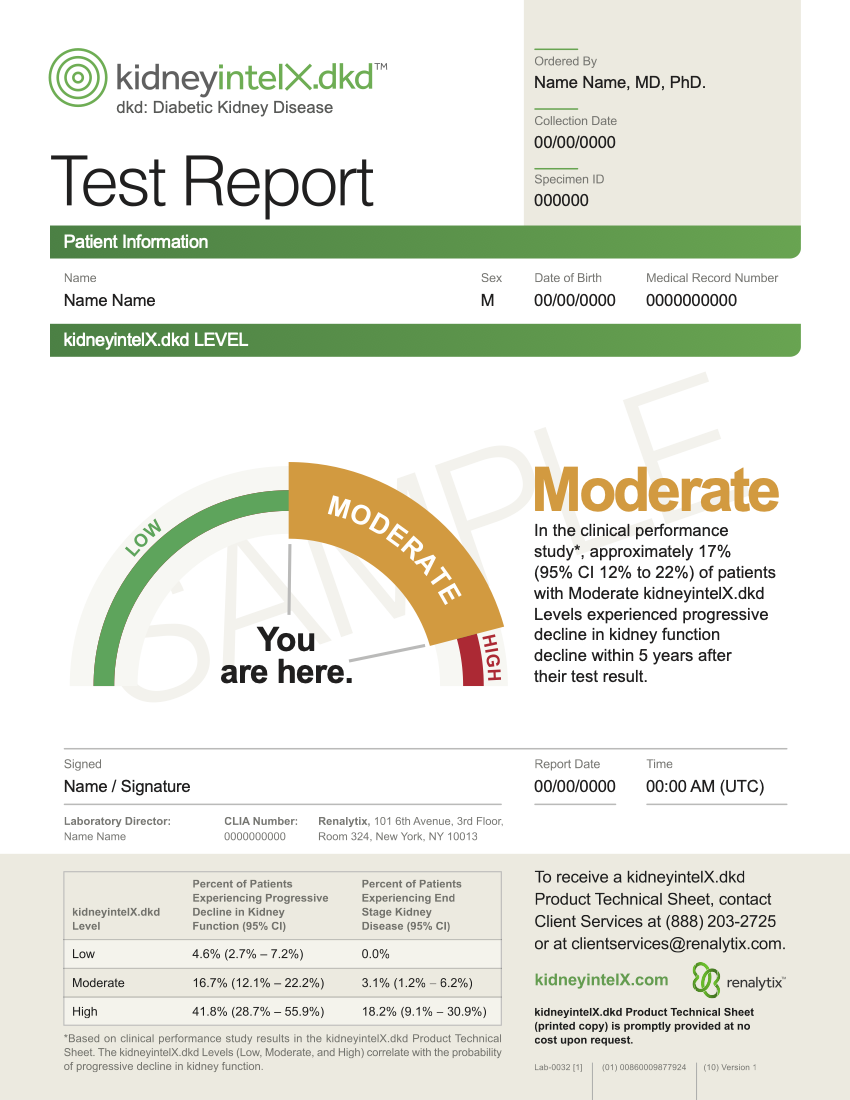We’re
Find important and useful information to support your efforts in early-stage (stages 1-3b) risk assessment of progressive decline in kidney function. Please download materials from this page directly. You can also reach out for additional assistance by contacting our Client Success Team at 888.203.2725.
- Get FREE educational resources for your staff and patients here.
Clinical Information
Operational Information
Patient Resources
Clinical Information
Robust risk stratification for kidney outcomes in independent, multi-ethnic cohorts, Diabetes, Obesity and Metabolism
- The clinical validation study for kidneyintelX.dkd demonstrated an unadjusted HR for high vs low risk at 18-fold and 8-fold, respectively, when adjusted for age, sex, race, eGFR, UACR, A1C and BP.
- Patients who received a high risk result had an estimated event (progressive decline in kidney function) rate of 67% over a 5-year period.
Derivation and validation of a risk result to predict progression of diabetic kidney disease, Diabetologia
Study goal was to validate the performance of a new biomarker-enriched, machine learning risk score to predict progressive decline in kidney function in adult type 2 diabetic patients with chronic kidney disease and compare the performance with standard clinical models.
Clinical Utility of KidneyIntelX with Early Stages of Diabetic Kidney Disease (DKD), American Journal of Nephrology
Study goals were to:
- Demonstrate that baseline KidneyIntelX assessment provides accurate risk stratification for kidney outcomes in a multi-national population
- To assess the impact of canagliflozin versus placebo in patients within risk strata of KidneyIntelX risk
- To assess the impact of SGLT2i treatment on changes in longitudinal KidneyIntelX risk scores over time
- To determine the added value of stages 1-3b longitudinal changes in KidneyIntelX for forecasting subsequent kidney outcomes (i.e., progressive DKD).
Highly robust analytical assays for all three biomarkers, Clinical Proteomics
Study goals were to:
- Uses highly sensitive and accurate electrochemilluminesence technology.
- All 3 biomarkers measured together from the same sample for increased measurement consistency.
- Tested for robustness for interference from over 40 medications and dietary supplements.
- Demonstrated precision over multiple handling and testing conditions.
Key findings included:
- Marked increase in SGLT2i and GLP-1 RA use in intermediate and high risk patients in 2500+ patient study at Mount Sinai.
- Increase in ACEi/ARB use.
- Improved patient awareness of diabetes and kidney disease.
- Increase in appropriate specialist referrals.
Improved clinical outcomes:
- Diabetes: Lower A1c.
- Heart: Improved BP control.
- Kidney: Lower albuminuria and improvement in eGFR slopes.
Operational Information
Want someone to help you with every step in the process?
Request a Meeting with an Account Executive here.
Order kidneyintelX.dkd by calling
Fill out order form and call our Client Success Team at 888.203.2725.
kidneyintelX.dkd Risk Assessment Reports
View samples for risk assessment reports for low, moderate and high- risk patients.
Patient Educational Resources
If you are an adult patient with type 2 diabetes, you are at higher risk for also developing chronic kidney disease. Diabetes can affect how well your kidneys filter waste from your body. Most people don’t realize their kidneys are failing until it’s too late. Kidney failure requires dialysis or transplant. There is a lot you and your doctor can do to get ahead of this. It starts with a diagnosis of kidney disease. If diagnosed, kidneyintelX.dkd, a simple blood test, can help you and your doctor understand your individual risk for kidney disease progression.
If you are an adult patient with type 2 diabetes, you are at higher risk for also developing chronic kidney disease. Diabetes can affect how well your kidneys filter waste from your body. Most people don’t realize their kidneys are failing until it’s too late. Kidney failure requires dialysis or transplant. There is a lot you and your doctor can do to get ahead of this. It starts with a diagnosis of kidney disease. If diagnosed, KidneyIntelX, a simple blood test, can help you and your doctor understand your individual risk for kidney disease progression.


